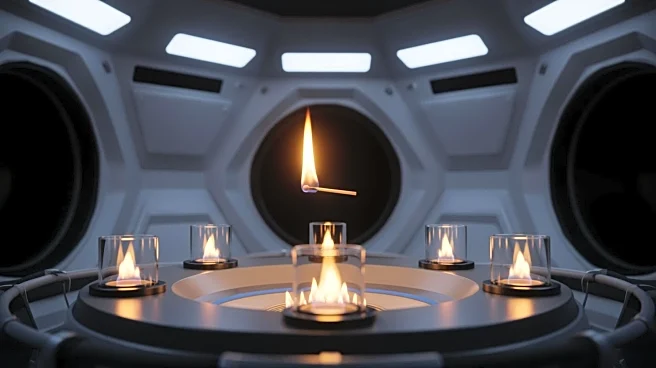What's Happening?
Chinese astronauts Gui Haichao and Zhu Yangzhu conducted a live demonstration aboard the Tiangong space station, showcasing the unique behavior of fire in microgravity. On September 21, 2023, they lit
a match and a candle, revealing a flame that formed a glowing sphere instead of the typical teardrop shape seen on Earth. This demonstration was part of an educational broadcast aimed at students, illustrating how fire behaves differently when gravity is absent. In microgravity, convection does not occur as it does on Earth, causing heated gases to spread evenly and oxygen to reach the flame through slow diffusion, resulting in a round, slow-burning flame.
Why It's Important?
Understanding combustion in microgravity is crucial for future space missions, particularly long-term journeys to the Moon or Mars. Knowledge of how fire spreads in space can significantly impact safety protocols and the design of life-support systems and fire suppression technologies. The insights gained from such experiments can lead to the development of safer materials and better emergency procedures, ensuring crew safety and mission success. The Tiangong space station's ability to conduct controlled combustion experiments provides valuable data that can inform future space exploration efforts.
What's Next?
The Tiangong space station continues to offer opportunities for educational demonstrations and scientific research in microgravity. Future experiments may focus on refining fire suppression technologies and improving life-support systems for long-duration space missions. As space agencies prepare for missions to the Moon and Mars, understanding microgravity combustion will be integral to ensuring the safety and success of these endeavors. The insights gained from these experiments could lead to advancements in space travel technology and protocols.
Beyond the Headlines
The demonstration of microgravity combustion aboard the Tiangong space station highlights the importance of international collaboration in space research. While the International Space Station (ISS) has strict protocols regarding open flames due to past incidents, Tiangong's controlled environment allows for educational and scientific exploration. This approach not only advances scientific knowledge but also fosters global cooperation in space exploration, paving the way for shared discoveries and innovations.










